Top 5 Key Rules to Hire Solidity Developers for Business Success
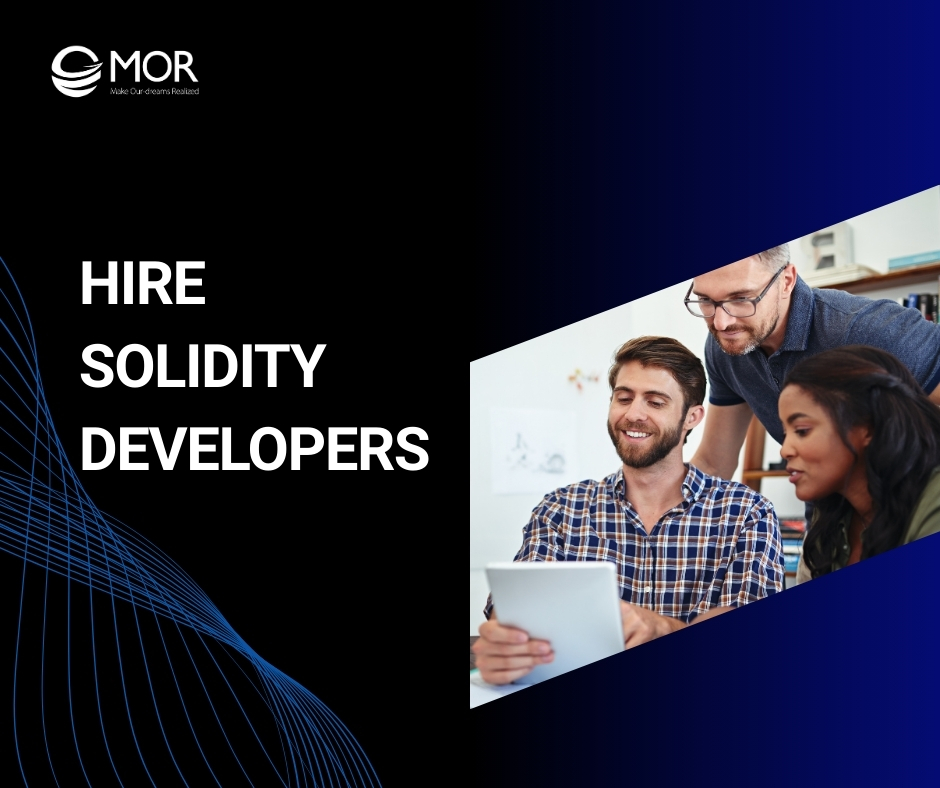
Hiring blockchain talent is tough, and the race to hire Solidity developers is more competitive than ever. Many companies waste time chasing the right Solidity developer for hire, struggling to assess skills or filter relevant Solidity jobs. This MOR Software’s guide shares the top rules to make better hiring decisions and build strong blockchain teams.
What Do Solidity Developers Do?
When businesses hire Solidity developers, they gain experts who design, deploy, and maintain smart contracts that power Ethereum-based applications. These contracts are the backbone of decentralized apps, making the developer’s role vital for any blockchain initiative.
On Ethereum alone, there have been 69,788,231 smart contracts deployed as of February 15, 2025. This shows the scale of the code these engineers are expected to secure and maintain.
A Solidity developer for hire doesn’t just write code but ensures that every contract is secure, efficient, and aligned with business goals.
The core responsibilities often include:
- Writing and deploying gas-efficient smart contracts
- Running audits and security tests to prevent vulnerabilities
- Building integrations tailored to specific business needs
- Supporting technical connections with partners and platforms
- Creating documentation to uphold quality standards
- Working alongside managers, designers, and QA teams
- Engaging with project leaders and blockchain communities
- Exploring new tools and repositories to refine product quality
By handling these tasks, a skilled Solidity dev helps companies launch reliable blockchain solutions that can scale with confidence.
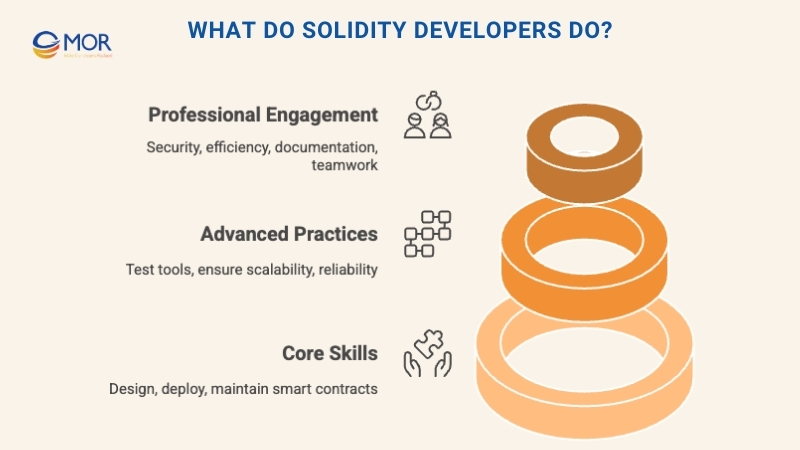
Why The Demand To Hire Solidity Developers Keeps Rising?
The decision to hire Solidity developers has been growing at a rapid pace as blockchain adoption moves into the mainstream. Solidity remains the most widely used language for Ethereum and its compatible networks, making it the go-to skill for anyone building decentralized applications.
The DeFi ecosystem built largely on Solidity remains very large in dollar terms, with Ethereum DeFi TVL around 91 billion USD in late August 2025.This is below the 108 billion peak in November 2021 but still substantial.
Businesses seeking to innovate in this space now look at a Solidity developer for hire as an essential part of their technical team.
A few important drivers behind this rising demand include:
- Popularity of Blockchain Technology: Enterprises and startups are exploring blockchain for payments, supply chain, gaming, and more. This trend naturally raises the need to hire Solidity developers who can create production-ready smart contracts.
- Compatibility with EVM Networks: Solidity works across Ethereum, Polygon, Avalanche, and BNB Chain, enabling companies to scale projects across ecosystems with a single code base.
- Expansion of DeFi: The DeFi sector, valued in the billions, runs mostly on Solidity contracts. New protocols constantly require skilled developers to maintain and expand functionality.
- Supply and Demand Dynamics: The shortage of trained talent means companies must compete to hire Solidity developers, often offering high salaries and better perks to secure expertise. Electric Capital counted 39,148 new developers exploring crypto in 2024 and a 27% year over year rise in established developers. This is a sign of intense developer activity that keeps competition for top Solidity talent high.
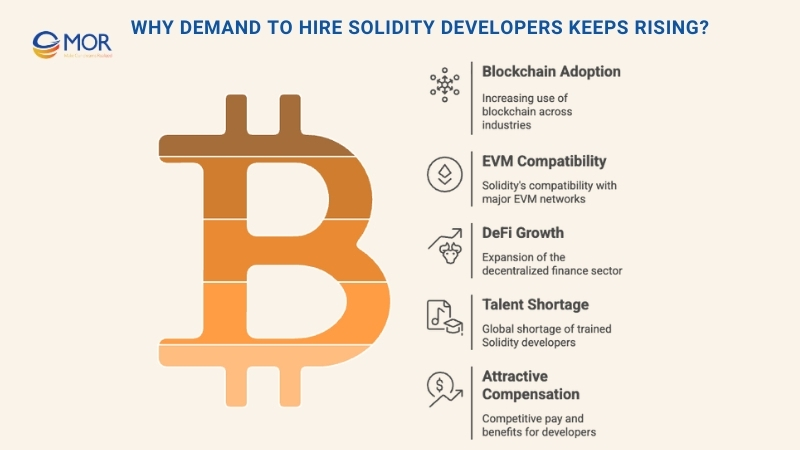
Top 5 Rules To Follow When Businesses Hire Solidity Developers
Now it’s time to explore how businesses can hire Solidity developers, evaluate their skills accurately, align expectations, and bring them on with confidence.
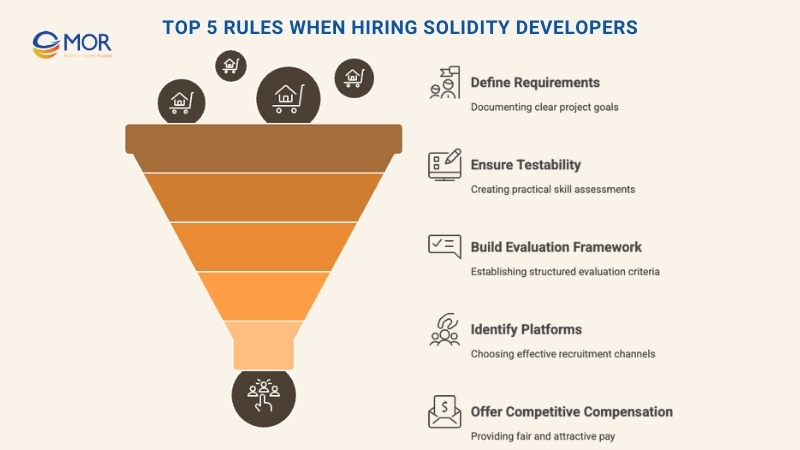
Define Your Project Requirements Early
To successfully hire Solidity developers, businesses must start with clear and well-documented requirements. This step shapes the entire recruitment process, helping teams identify the right expertise and avoid mismatches.
Defining expectations early also ensures that when you decide to hire Solidity developer talent, both the company and the candidate share the same vision.
Because Ethereum and related ecosystems evolve quickly, project needs may shift over time. That makes it even more important to outline flexible yet realistic goals from the beginning. A few best practices include:
- Prioritize your requirements by importance and project impact. For instance, if you’re building on a tight budget, you should decide on an acceptable range for a Solidity developer’s compensation before starting the hiring process.
- Align the vision of stakeholders. Miscommunication between business and technical teams can derail a project. Take the time to openly discuss requirements, preferred skills, and must-have qualifications. Documenting these agreements helps keep everyone aligned and prevents conflicts down the line.
Once this groundwork is laid, companies set themselves up to hire Solidity developers with confidence and clarity.
Ensure Your Requirements Are Testable
Once you’ve defined and aligned the skills needed to hire Solidity developers, the next step is making sure those requirements can be tested. Without measurable criteria, it’s impossible to confirm whether a candidate truly has the abilities your project demands.
Clear, testable requirements give hiring managers confidence and reduce the risk of onboarding someone who isn’t the right fit.
Here’s how non-testable and testable requirements differ:
Non-testable requirement | Testable requirement |
| The developer should understand blockchain technology. | The developer should write and deploy a smart contract on Ethereum. |
| This is vague and subjective. “Understanding” means different things to different people, and it cannot be consistently verified. | This is measurable and objective. The candidate’s ability to build and launch a contract proves they have the skills you expect. |
When requirements are written this way, you reduce mistakes during evaluation and make it easier to identify the right Solidity developer for hire. Structured testing also shortens the selection process, ensuring your project moves forward without costly delays.
Build A Clear Evaluation Framework
Among all the steps to hire Solidity developers, evaluating their skills can be the hardest. Once requirements are defined and made testable, the next step is to structure an evaluation process.
A framework helps verify a candidate’s abilities in blockchain architecture, smart contract coding, Web3.js, decentralized app interfaces, and security practices. It also provides measurable tasks and performance standards so that hiring decisions are based on proof rather than assumptions.
Evaluation criteria | Evaluation tasks and questions | Performance standards |
| Blockchain architecture: nodes, chains, miners, blocks | Explain the role of miners in a blockchain network. | Candidate must clearly describe how miners validate and secure transactions. |
| Smart contract development: Solidity syntax, data types, control structures | Write a contract for a token sale. | Code must meet requirements and compile without errors. |
| Web3.js: using JavaScript to interact with Ethereum | Use Web3.js to pull data from a deployed contract. | Candidate must retrieve and display accurate contract data. |
| DApp development: front-end for decentralized apps | Build a simple interface connected to a contract. | The interface must be functional and user-friendly. |
| Security: common vulnerabilities and fixes | Explain how to prevent reentrancy. | Candidate must show awareness of risks and mitigation steps. |
Even with a structured framework, assessing skills still requires technical know-how. If your team lacks blockchain expertise, there are practical ways to handle the evaluation process and still hire Solidity developers effectively.
- Work with a third-party consultant. If you’re starting a project from scratch, bringing in a blockchain consultant can help confirm whether candidates’ abilities align with your requirements. They can guide you through both the technical and hiring steps.
- Choose pre-vetted developers. Another option is to collaborate with a trusted provider or hire smart contract developer talent that has already gone through rigorous vetting. This reduces risk and saves time, giving you confidence that the person you select can deliver results.
When companies follow these paths, they can still evaluate candidates properly and make informed decisions when they hire Solidity developers, even without in-house expertise.
Identify The Right Platforms To Hire Solidity Developers
Once you’ve set project requirements, confirmed they are testable, and built an evaluation process, the next step is knowing where to look.
Businesses aiming to hire Solidity developers should cast a wide net, building a talent pool from multiple reliable sources. This improves the chances of connecting with active candidates instead of waiting for applications that may never arrive.
Posting job ads on boards like Indeed or Glassdoor is one option, but it tends to be slow. Most applicants there are passive job seekers, which makes this approach less effective for urgent blockchain projects.
Another path is reaching out directly on LinkedIn, where expanding your network can uncover qualified candidates faster. Additionally, platforms built specifically for blockchain hiring, such as Web3Careers, can connect you with specialists who already have relevant experience.
Important tip!
- Save time with sourcing services. Searching manually, screening resumes, and vetting skills takes significant effort. Partnering with a sourcing provider or a trusted firm to hire Solidity developer talent ensures you meet pre-qualified candidates who are already matched to your needs.
Through the use of the right platforms, businesses streamline recruitment and secure the best talent when they hire Solidity developers.
Offer Fair And Competitive Compensation
The final rule when businesses hire Solidity developers is to present a salary range that matches what professionals expect in today’s market. Compensation varies widely based on experience, seniority, and location, so aligning your offer with industry standards is key to attracting and retaining talent.
Companies that ignore this risk losing candidates to competitors who are willing to pay fairly. If you plan to hire Solidity development company support, keep in mind that rates may also differ depending on whether you work with in-house staff or external teams.
Average Solidity Developer Salaries In The US By Seniority
Below is an overview of what developers typically earn in the United States. As shown, senior specialists make nearly double what juniors earn, putting them among the best-compensated roles in the ICT sector.
Seniority level | Average annual Solidity developer salary ($) |
| Junior Solidity developer | $50,000 |
| Middle Solidity developer | $82,100 |
| Senior Solidity developer | $100,000 |
Average Annual Salaries Worldwide
Compensation for blockchain talent isn’t limited to the US market. Globally, salaries for Solidity specialists remain strong, with some regions approaching or even matching American levels.
This shows how competitive it has become for businesses that want to hire Solidity developers across borders. If you plan to hire smart contract developer talent from abroad, expect variations depending on both skill level and local market conditions.
Country | Average annual Solidity developer salary ($) |
| Mexico | $82,000 |
| Brazil | $60,000 |
| Portugal | $87,000 |
| Germany | $75,000 |
| The Czech Republic | $80,000 |
| Ukraine | $60,000 |
So, how do you decide on a fair salary package? Consider these guidelines:
- Match salary to seniority. Senior Solidity developers often earn about twice as much as entry-level hires, so structure offers accordingly.
- Factor in local averages and cost of living. Research the country where you plan to recruit, but keep in mind that Solidity developers usually earn $15,000–$20,000 more annually than other ICT specialists.
When businesses weigh these factors, they can present fair offers that attract and retain the right candidates when they hire Solidity developers.
Essential Skills Before Businesses Hire Solidity Developers
Before companies hire Solidity developers, it’s important to evaluate whether candidates have the right skills to deliver secure and scalable blockchain solutions. Choosing a hire Solidity development company that can provide developers with these abilities is often the safest path forward.
- Solid grasp of blockchain technology: Developers must understand Ethereum fundamentals, including the Ethereum Virtual Machine (EVM) and consensus models. This foundation ensures smart contracts are reliable and secure.
- Strong Solidity programming skills: The ability to write, test, and deploy smart contracts efficiently is non-negotiable. Clean and gas-optimized code is at the core of a developer’s work.
- Hands-on experience with frameworks: Knowledge of tools like Truffle, Hardhat, and Embark, along with testing frameworks such as Mocha and Chai, makes development smoother and less error-prone.
- Knowledge of Web3 and JavaScript: Since decentralized apps often rely on web3.js or ethers.js, a capable developer should navigate these libraries with ease.
- Smart contract security expertise: Understanding threats like reentrancy or denial-of-service attacks, and knowing how to mitigate them, is critical for protecting assets.
- Strong debugging ability: Developers should locate and fix errors quickly, while also conducting peer reviews to keep contracts clean and safe.
- Awareness of DeFi and NFTs: A good developer understands the mechanics of decentralized finance and NFT platforms, which are major drivers of blockchain adoption.
- Communication and teamwork: Success in blockchain projects requires clear collaboration with designers, QA, and non-technical stakeholders alike.
- Adaptability and ongoing learning: Since the blockchain field changes rapidly, developers need the discipline to keep up with new tools, patterns, and trends.
- Passion for blockchain: Beyond technical skill, the best candidates show genuine excitement for decentralized apps and the future of smart contracts.
Through careful screening of these skills, businesses that hire Solidity developers can reduce risks and build products that stand the test of time.
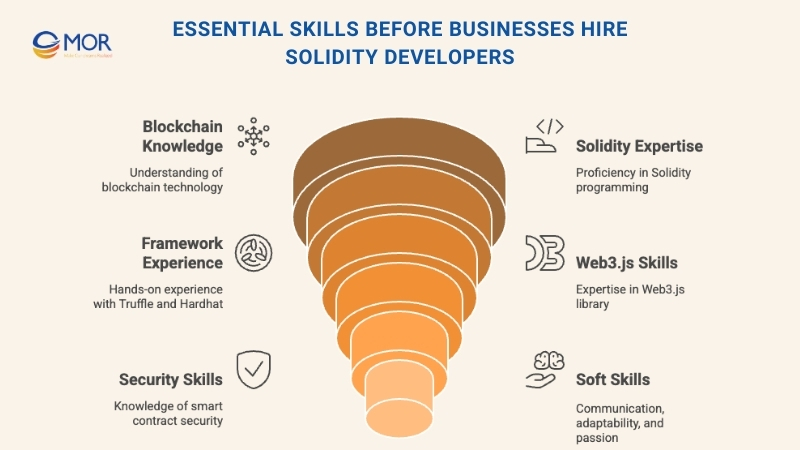
Common Challenges When Businesses Hire Solidity Developers
Even as demand grows, many companies face obstacles when they set out to hire Solidity developers. The language’s complexity, limited resources, and the market’s talent shortage make recruiting skilled professionals far from straightforward.
- Solidity is a complex language. Created in 2014 for writing Ethereum smart contracts, Solidity quickly became the most widely used tool for blockchain applications. Research published in PLOS ONE confirms it leads among smart contract languages. Yet its unique rules and constraints pose challenges that traditional developers don’t face, making it harder to find specialists ready to deliver.
- Learning resources remain limited. Unlike older languages, Solidity offers fewer educational materials, which means many developers are self-taught. As the blockchain space evolves quickly, developers must constantly update their skills in privacy, security, and new tools.
- High demand, low supply. Estimates suggest around 200,000 developers in the Ethereum ecosystem, while job postings continue to climb across freelance platforms and career sites. This imbalance makes it difficult to secure talent.
- Unclear salary benchmarks. Pay varies widely, from $120,000 to $250,000 annually, depending on experience and region. Without clear industry standards, companies struggle to decide what’s fair when they hire Solidity developers.
- Skill evaluation is difficult. With no universal testing criteria, only someone more advanced than the candidate can accurately assess their abilities. This puts non-technical founders at a disadvantage when trying to hire Solidity development company support or individual contractors.
Despite these hurdles, businesses can still succeed in recruitment by following structured hiring rules and partnering with trusted sourcing providers. With the right approach, it becomes much easier to hire Solidity developers who are a strong match for project goals.
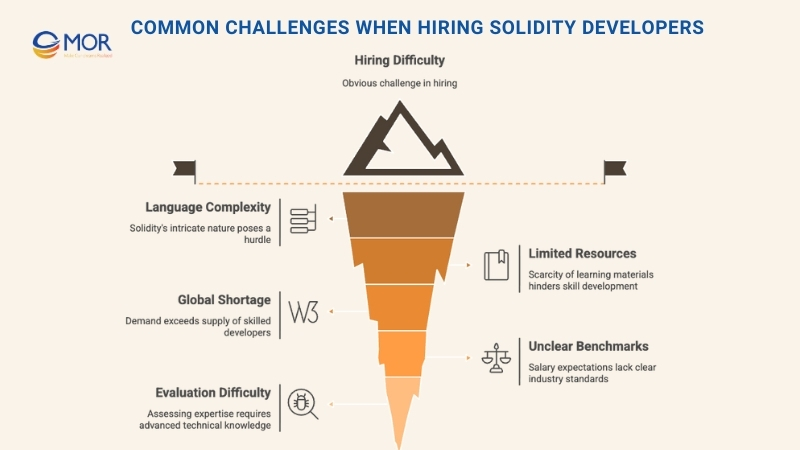
Why Hire Solidity Developers from MOR Software?
Hiring Solidity developers is not just about coding smart contracts, it’s about finding a partner who understands blockchain business cases and can deliver scalable, secure solutions. At MOR Software, we provide that balance of technical skill and real-world delivery.
Our teams combine years of experience in blockchain, fintech, and enterprise-grade development. With global offices in Vietnam and Japan, we’ve worked with partners across industries to turn complex blockchain ideas into production-ready applications.
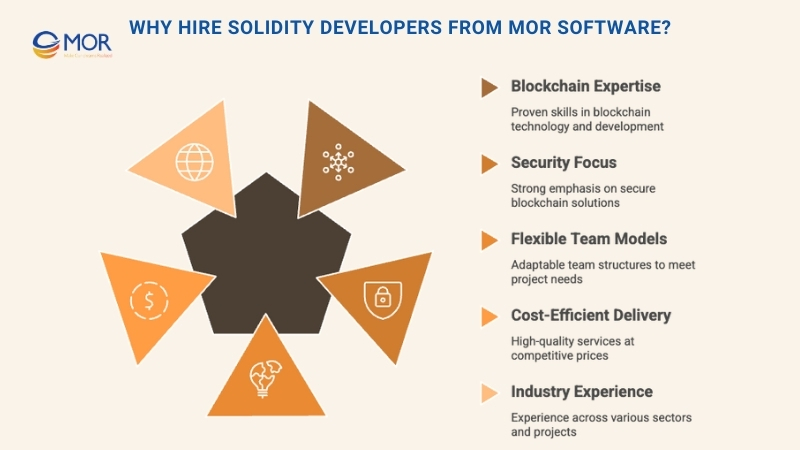
Here’s what sets us apart:
- Proven blockchain expertise: Our engineers specialize in Solidity, Ethereum Virtual Machine (EVM) networks, and popular frameworks like Truffle, Hardhat, and Web3.js. We’ve delivered smart contract development, audits, and DApp integrations for startups and enterprises alike.
- Security-first approach: From DeFi platforms to NFT marketplaces, security is non-negotiable. Our QA team applies strict testing protocols and audit practices to protect your assets and reputation.
- Dedicated team model: Need a full squad of Solidity developers, or just a few specialists to extend your in-house capacity? We provide flexible engagement models so you can scale talent as your project grows.
- End-to-end delivery: Beyond Solidity, we cover front-end, back-end, and cloud infrastructure, making us a one-stop partner for complete blockchain solutions. This means you won’t need to juggle multiple vendors.
- Cost efficiency with quality: Based in Vietnam, we deliver global-standard software at highly competitive rates, helping you stay lean while getting access to senior-level talent.
When you hire Solidity developers from MOR Software, you’re not just filling a position. You’re gaining a team that understands how to align blockchain development with your business goals, from concept to deployment.
Contact us today to explore how our Solidity experts can accelerate your next blockchain project.
Conclusion
The race to hire Solidity developers is more competitive than ever, and success depends on clear requirements, structured evaluations, and fair compensation. By following proven rules and working with an experienced partner, businesses can avoid costly mistakes and secure the right talent. At MOR Software, we make it easier to connect with skilled blockchain engineers who understand both technology and business needs. Contact us today to discuss how our Solidity experts can bring your blockchain vision to life.
MOR SOFTWARE
Frequently Asked Questions (FAQs)
How much do Solidity developers make per hour?
On average, Solidity developers earn around $58 per hour in the United States. Entry-level positions typically start near $50 per hour, while top earners can make up to $71.
Is Solidity still in demand?
Yes. Solidity developers continue to be highly sought after because blockchain adoption is expanding rapidly across DeFi, NFT projects, and smart contract development.
What does a Solidity developer do?
A Solidity developer specializes in creating and managing smart contracts on Ethereum-based platforms. Their responsibilities include designing, deploying, and auditing contracts for decentralized applications.
How to become a Solidity developer?
Start by learning Solidity along with supporting technologies like NodeJS and React. Practice by building small decentralized applications to strengthen your Web3 portfolio, which is essential for both career growth and entrepreneurial projects.
How to get a job with Solidity?
Employers look for developers with strong skills in Web3 ecosystems, blockchain fundamentals, and smart contract programming. Roles may include Solidity Developer, Blockchain Engineer, Smart Contract Auditor, or NFT-focused developer.
Rate this article
0
over 5.0 based on 0 reviews
Your rating on this news:
Name
*Email
*Write your comment
*Send your comment
1